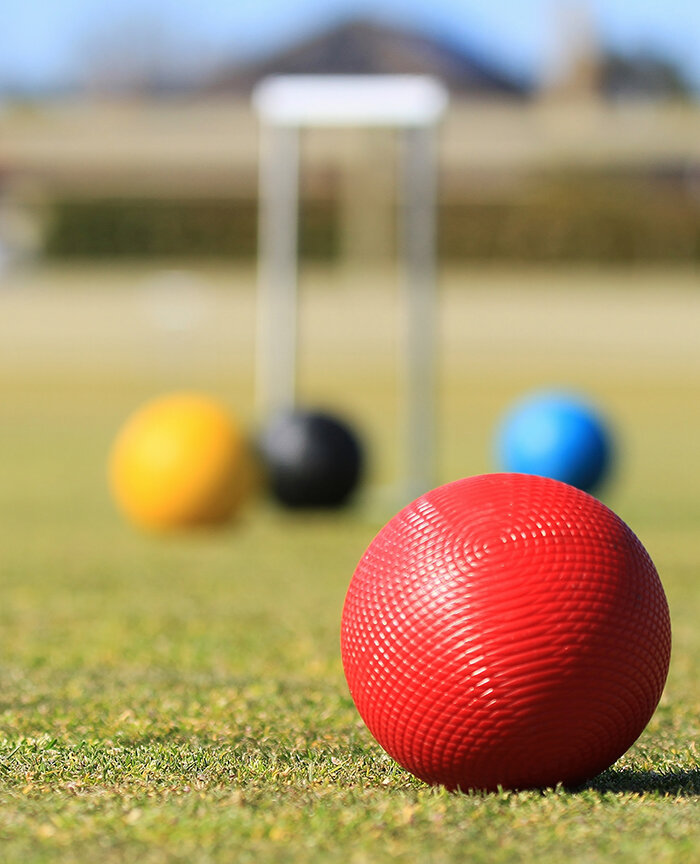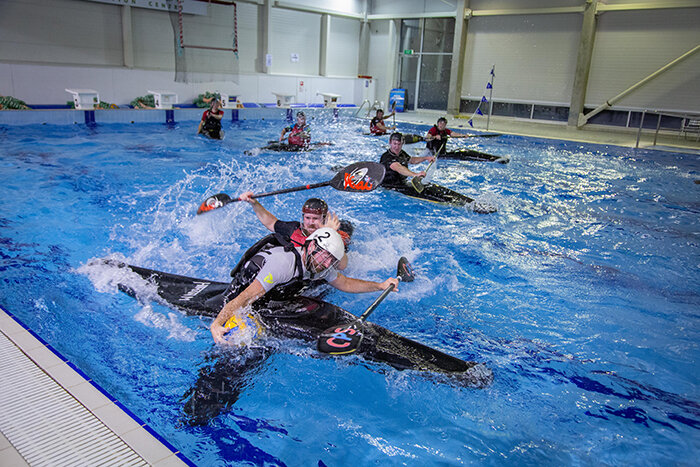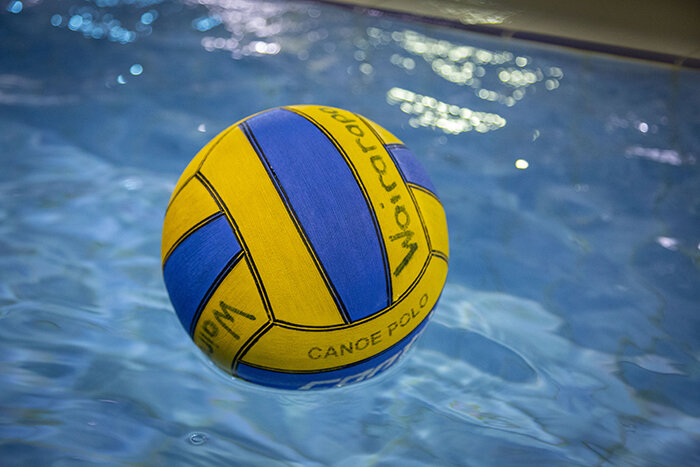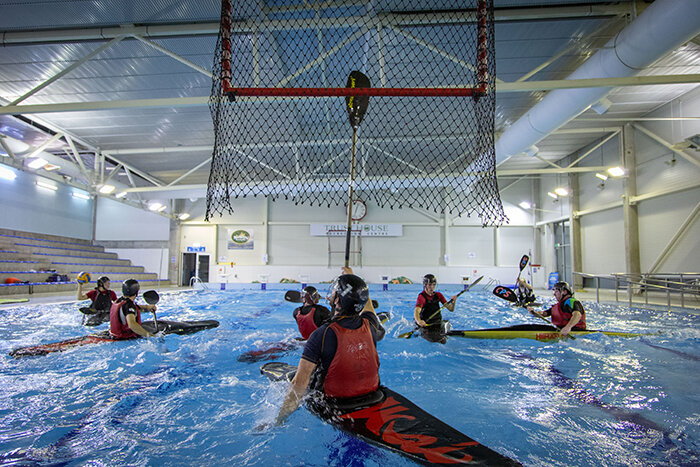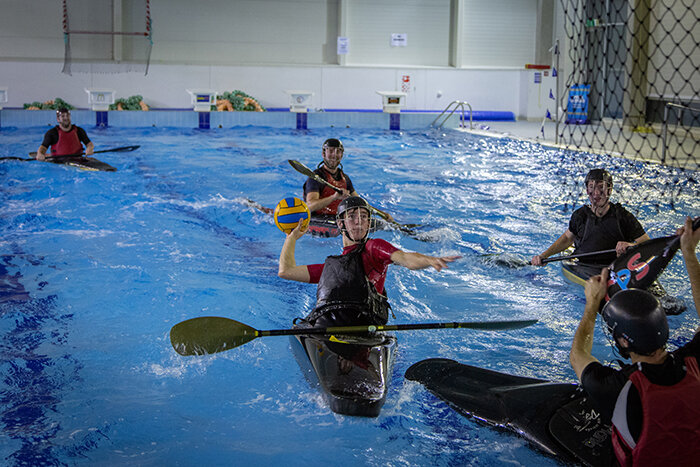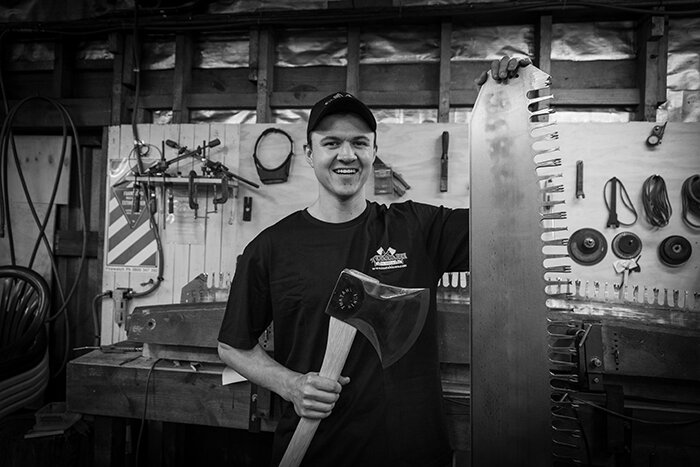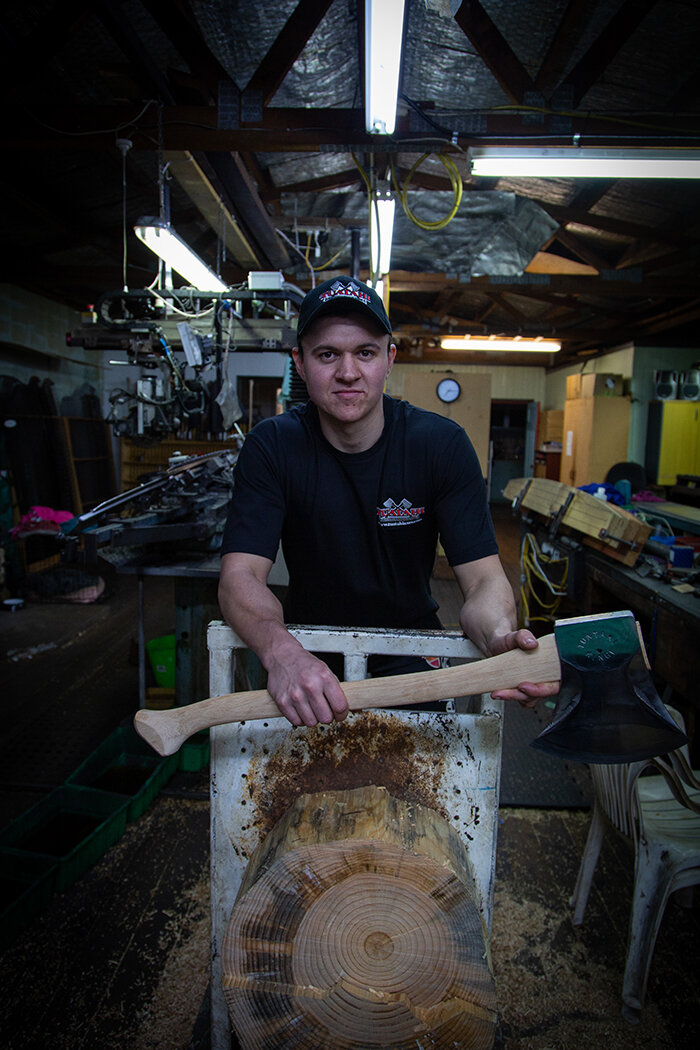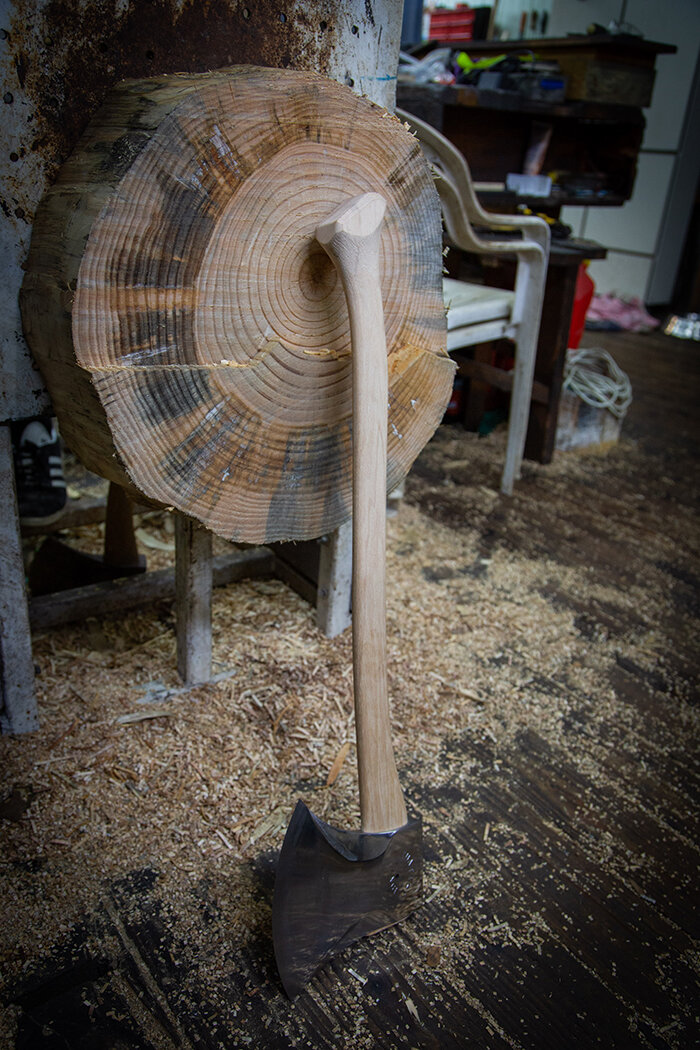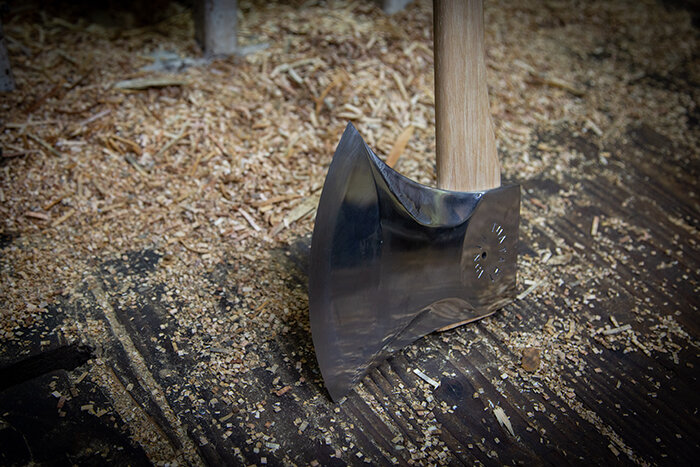Everyone’s a winner
Rugby may be our national obsession, but there’s quite a bit going on that doesn’t involve an oval-shaped ball. Erin Kavanagh-Hall takes a look at a few who play some of the region’s lesser known sports. Photos by Sarah Watkins.
Making a splash
Fans of canoe polo describe it as “basketball on the water”. Five players per side, two fast-paced halves per game, smashing the ball through a 2 metre high goal, high-speed sprints, a few collisions expected.
“It’s a full contact sport,” Sam Ludden, long-time canoeist and president of the Wairarapa Paddlers polo club, says. “People who watch our games tell us they had no idea what went on – but it looked bloody exciting.”
Thirty-odd years ago, when Sam paddled his first canoe on the Waiohine Gorge, the Wairarapa was the “canoe polo hub”. Most intermediate and secondary schools had a team – the 33 yard Imperial swimming pool lent itself well to training and tournaments.
However, by the 2000s, participation had diminished, the Imperial closed, and the replacement Recreation Centre lacked the capacity for the schools’ training sessions.
Nowadays, the Wairarapa Paddlers think outside the square, and their regular training ground is usually at winery Urlar Estate which has its own freshwater dam.
The Wairarapa Paddlers has formed two competitive teams, one of which won the C Grade at the New Zealand National League Championships. Two young members have made the national women’s under-18 squad, and long-time paddler Kyzen MacDonald coaches the New Zealand senior men’s team.
Sam puts the club’s survival down to a core group of “passionate people” – particularly club manager and “polo Mum” Lyn Russell.
“We’ve had some great support – a local builder made our goals, and Lyn has done a huge amount of fundraising for our gear. New gear can set you back about $4,000. Although if people want to give polo a go, they just need to rock up with a pair of togs.”
Club coach Robin Russell, Lyn’s son, says canoe polo is suitable for all ages and fitness levels.
“You get smoked by a 12-year-old, then destroyed by a 60-year-old – water is the ultimate equaliser.”
Out in the open ocean
There are times when Piers Fuller struggles to come up with a reason why he enjoys open water swimming. As water sports go, lake and ocean swimming races are pretty “hard core”. You can get “knocked around” by other swimmers, side-swiped by waves, slowed down by headaches and cramps (thanks to the cold), and have to jostle through clouds of jellyfish.
“You suck it up, and keep going. I love the feeling of accomplishment that comes afterwards.”
Piers, coach of the Masterton Swimming Club, is one of a small but keen crowd of open water swimmers in Wairarapa. Piers re-discovered his love of swimming after joining the Masterton Masters Swimming Club at 31, and became hooked on open water swimming after his brother challenged them both to completing an Iron Man. He has since competed in swims across Wellington Harbour, Oriental Bay, and Lakes Rotorua and Taupo, as well as several Iron Man events and triathlons.
Preparing for an open water race in a pool, Piers says, is “interesting” as your technique has to be modified for the new conditions.
“If you’re in an environment where there are lots of waves, you have to practise breathing to one side to avoid getting hit in the face. You’re swimming towards a target but, in the open water, you’re staring down into darkness so it’s easy to veer off course. So, you practise lifting your head every six or so strokes so, when you’re out on the ocean, you can see the buoy up ahead.
“You see some weird, shadowy shapes in the water. At least you have safety in numbers!”
For Piers, open water swimming has become a “friendly family rivalry” with his two sons, brother and nieces and nephew joining him in competition. He is currently preparing for a sprint across Pilot Bay at Mt Maunganui in January.
“It’s always an adventure. The camaraderie and shared feeling of achievement between the swimmers is great.”
Grit on the green
Some of the best advice Carissa Price has received is to “play croquet like a man – play gritty”.
The grit on the green has clearly paid off – Carissa is a national champion, and ranked 29th among the world’s best women croquet players.
“It is still quite a male-dominated sport in New Zealand, so men and women often play together. Women tend to use more defensive strategies, whereas men definitely play more aggressively.
“I’m not intimidated. I’ve got to the point where I can out-hit most of the men I play against.”
Many people’s introduction to croquet came in the form of Alice In Wonderland, where hedgehogs are sent flying by laughing pink flamingos. In actuality, croquet is a highly-strategic, sometimes vicious sport, requiring both powerful command of a mallet and mathematical precision.
Carissa began the sport in 2011, while recovering from a knee injury, when her father Terry encouraged her to play in a Christmas bash hosted by Carrington Croquet Club in Carterton. Shortly afterwards, Terry entered her in the club championships. Coached by her Dad, Carissa started competing in New Zealand-wide tournaments, at least eight or nine per season.
Croquet, Carissa says, is “like a cross between snooker and chess, played on a lawn”. The object of the game is to hit both your balls through a sequence of 12 hoops (six in one direction, then the same six in the opposite direction), and finish by hitting the centre peg. The more you advance, the narrower the hoops and the more meticulous your shots.
“It’s about minding your angles, and outsmarting your opponent. There are a few different shots you can take, and grips to use.”
Earlier this year, Carissa won the New Zealand Women’s Invitational Open, held at Masterton Croquet Club. Her goal is to make it to the Women’s World Championships in Christchurch next year.
She credits father Terry with instilling her competitive spirit.
“As a coach, he’s pretty tough and to the point. He pushes me. But, when I won the Invitational, he was totally the proud Dad.”
From a wood chopping dynasty
Quintin Fawcett comes from a long line of axemen. His grandfather Eddie Fawcett, like his father before him, has been involved in competitive wood-chopping since his teens, and is founder of Masterton-based Tuatahi Racing Axes and Saws which serves a massive client base in Europe and America.
Quintin and his Dad, Grant Fawcett, both work in the Tuatahi forgery, and are regulars at A&P shows throughout the country. Quintin, 24, attended his first competition as a baby, though he didn’t start competing until his first year of secondary school.
“That’s late by our standards – most kids from wood chopping families start at about seven or eight.”
Axemen, either individuals or teams, are presented with a log, and whoever is first to slice it into pieces is the winner. The sport has roots in 1870s Tasmania where two axemen bet 25 pounds as to who could first fell a tree.
Quintin takes about three trips to Australia for competitions each year and is heading to the Royal Melbourne Show in September. The key to victory, he says, is being able to read the wood in front of you and choosing the right axe or saw blades for the job.
“If you know your wood, a smaller guy can easily beat the big guys. When I go to Melbourne, I’ll be taking eight different axes with me – some of the top guys will have about 60 axes with them.”
A competition-standard axe sets you back $695, a saw about $2,000. Wood chopping is a professional sport, but axemen don’t generally make back what they invest, Quintin says.
“They do it for the love of the sport. But, there’s been a lot of investment from STIHL recently, which has allowed people to carry on.”
Quintin’s grandfather Eddie was recently awarded the Queen’s Service Medal for services to wood chopping.


